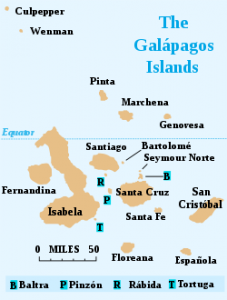Tag Archives: Galapagos
Costa Rican Boat Caught With Hand in Cookie Jar: Illegally Fishing in the Galapagos
The navy in Ecuador took charge of a fishing boat, of Costa Rican origin dubbed the Rosa I, which had a bountiful cargo of shark meat. This boat was seized in the Galapagos Islands, and an investigation is underway to determine whether the shark came from the archipelago, where shark fishing has been outlawed.
The vessel was halted just shy of 104 nautical miles northwest of Darwin Island with over 70 pieces of shark meat in its hold, Ecuavisa television reported.
This Costa Rican fishing boat had five crewman and a dog on board.
The investigators, from the Ecuadorian Navy, are still trying to determine if in fact the sharks were caught inside or outside a protected marine reserve.
It is a fact that the sharks were reeled in in international waters, however the fishing boat was forced to enter the Galapagos due to some emergency aboard, the captain of the vessel, Wainer Bonilla, explained to Ecuavisa.
“We entered Ecuadorian waters because we were having problems with the main engine,” Bonilla commented.
The crew on the Rosa I scratch out a living by fishing for sharks, which is perfectly acceptable in Costa Rica, Bonilla explained, adding that each portion of the shark meat nets them a cool $60 to $70 in the country.
This is the fourth such fishing boat which has been stopped in the Galapagos this year for illegal fishing.. It doesn’t look good does it?
Nor does it look good, that Costa Rican waters were over fished over the past few years… But only time will tell if the Rosa I and her crew were guilty of any crime.
Albino giants spotted in Galapagos and Australia
Divers enjoying the waters off Darwin, the northernmost island in the Galapagos, suddenly realised the presence of an amazing 33 feet (10 meter) albino whale shark (Rhincodon typus), and as if one sighting of an albino giant wasn’t enough, a snow-white southern right whale (Eubalaena australis) calf has now been spotted off the coast of Western Australia.
Common whale shark in the georgia aquarium. See picture of albino here
The whale shark encountered in Galapagos is and adult female and was first observed by naturalist Antonio Moreano as he guided a group of scuba diving tourists. “I told everyone to keep a distance and not disturb it so we all jumped in the water and followed it for five minutes.” says Moreano who also managed to get a few pictures of the awe-inspiring creature.
The young albino southern right whale lives in the whale nursery waters off Western Australia together with its 60-tonne mother. It has been given the name Wilgi Manung, which means “white whale” in one of the indigenous Australian languages. According to Doug Coughran, a senior wildlife officer with the department of environment and conservation, Wilgi Manung might not be a pure albino since its eyes and nose does not display the characteristic pink flesh normally seen in albino whales.
Albinism is a hypopigmentary congenital disordered. It can be partial or total, i.e. characterized by a partial or total lack of melanin pigment. Albinism is caused by recessive alleles and must therefore be inherited from both parents to manifest. Albinism has been observed in many different animals, including mammals, birds, fish, reptiles and amphibians. The name albinism is derived from albus, the Latin word for “white”.

